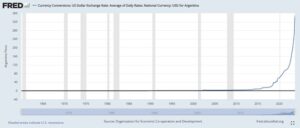This November witnessed the election of the world’s first expressly libertarian president as Javier Milei won a Nov. 19 runoff against Peronist economy minister Sergio Massa.
Milei is a highly charismatic figure who attracted 56 percent of the vote in that runoff after having also led all candidates in the primary round of voting back in August. Milei’s base of support was particularly concentrated among young voters who have grown up in an age of increasing economic chaos under the long-ruling Peronist party, as annual inflation has soared to 143 percent and 40 percent of the population has fallen into poverty.
Milei’s popularity is premised largely on the belief that he holds a unique understanding of how to solve this crisis because he is an adherent of a strain of economic thought most closely associated with renowned UNLV economics professor Murray Rothbard.
Rothbard was a highly prolific author who himself studied at New York University under the leading free market economist of the 20th century, Ludwig von Mises.
Rothbard believed that central banking spawns inflation and exacerbates recessions and was a founder of the libertarian think tank Cato Institute. He also developed a new political theory called anarcho-capitalism that combined free market economics with an absolutist view of human rights.
In both cases, Rothbard believed the state was the primary threat to the human potential and so developed a theory under which society could function without a government.
Milei describes himself as libertarian in the mold of Rothbard. After a career of economics consulting for large companies, Milei read Rothbard’s treatise on monopolies in 2014 and instantly became convinced. That book describes monopolies as resulting primarily from government grants of privilege which enrich connected firms while also impoverishing the population.
Milei went on to found the Libertarian Party of Argentina, which in 2021 joined with other small parties to form the Liberty Advances (Libertad Avanza) coalition. That year, Libertad Avanza elected four members to the lower house of the national legislature, including Milei. That chamber holds 257 seats. In the October 2023 general election, the party grew its representation in the lower chamber to 38 seats and captured eight out of 72 seats in the upper chamber while also catapulting Milei to the presidential runoff.
This meteoric rise of Argentine libertarianism occurs against a backdrop of an economy that has been in disarray for two decades.
As recently as 2001, the Argentine peso traded evenly with the U.S. dollar because the official monetary policy of Argentina is to peg the peso to the dollar.
Since the end of the Bretton Woods era in the 1970s, the United States and other Western powers abandoned fixed exchange rates, allowing currency prices to fluctuate in accordance with supply and demand.
For example, if an American auto manufacturer wants to buy parts from a German supplier, it must use its dollars to purchase Euros with which it can then purchase the parts it seeks. Exchanges like this are made daily across many industries throughout the world, affecting the prices of one currency in terms of another.
However, when a currency is fixed at an official exchange rate, the central bank must hold enough reserves of foreign currency to redeem its own bills on demand. For instance, when an American liquor distributor buys Argentine wine, it sends dollars to Argentina’s central bank, which then exchanges them for pesos to deliver to the winery.
In this way, the central bank is supposed to act like a clearing house that receives foreign currency and issues a corresponding amount of local currency that it puts into circulation.
However, the Argentine central bank has persistently issued currency to finance government deficits with currency not backed by foreign deposits. So, when Argentines attempt to use their currency to purchase imported goods, the bank doesn’t hold enough foreign currency to honor to fixed exchange rate for all the local currency in circulation.
As a result, the government was forced to abandon its currency peg in early 2002, which began a prolonged period in which the peso has become increasingly worthless. By September 2023, the official exchange rate had deteriorated to the point that it took 349.5 pesos to purchase $1.
 However, even this official rate is not reflective of the true rate: on the streets of Argentina it takes more than 1,000 pesos to purchase $1. Because the central bank still does not hold enough foreign currency to defend its official rate, it resorts to capital controls that prevent Argentines from exchanging money, sending money abroad or purchasing foreign goods.
However, even this official rate is not reflective of the true rate: on the streets of Argentina it takes more than 1,000 pesos to purchase $1. Because the central bank still does not hold enough foreign currency to defend its official rate, it resorts to capital controls that prevent Argentines from exchanging money, sending money abroad or purchasing foreign goods.
All of this has been the result of creating money out of thin air to finance government debt, which reached 147 percent of GDP in 2002, according to data from the International Monetary Fund.
For individual Argentinians, inflation has essentially rendered their savings worthless and made it difficult to procure basic necessities. At the same time, the money printing has effectively transferred wealth and purchasing power to the political establishment its contractors.
Milei’s Rothbardian message about the dangers of central banking and government overspending have therefore found fertile ground among an exasperated public. Life can hardly get worse for Argentinians and, as in America, sound money and fiscal discipline form the time-tested recipe for a growing economy.
Nevadans should be proud of the legacy of the Battle Born State’s most influential academic.
